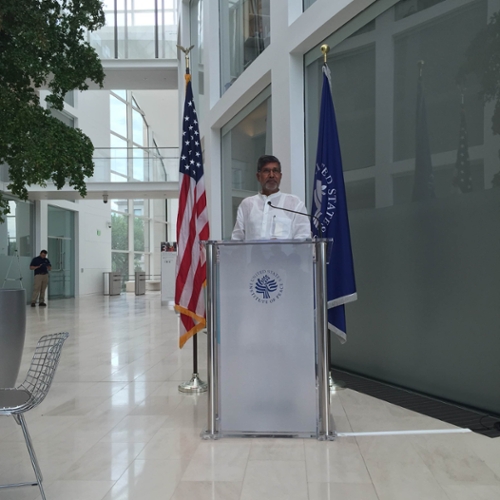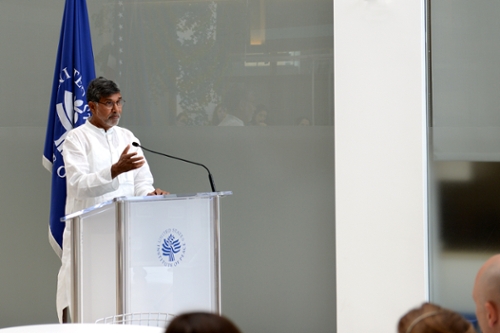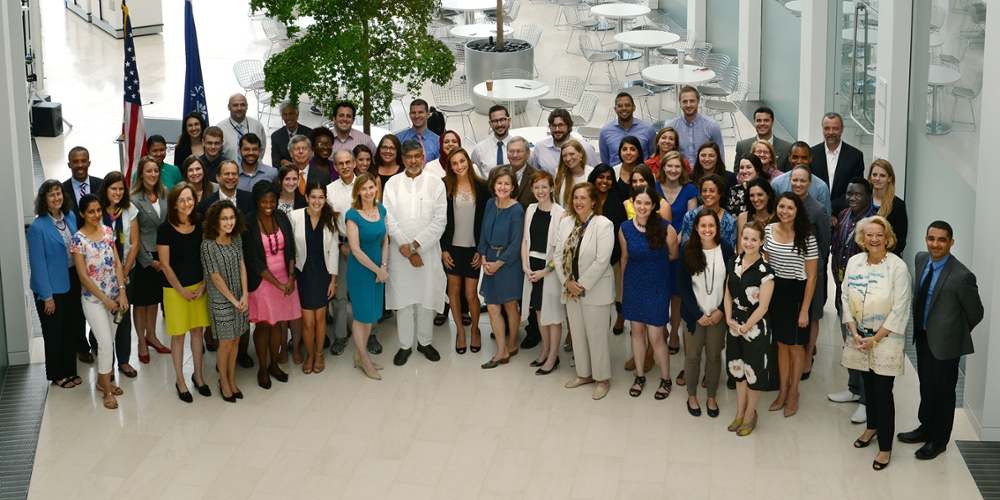Morning with Kailash Satyarthi, 2014 Nobel Peace Prize Winner

As my title for this week's blog reveals, a very special visitor to USIP this week overshadows all other blog topics I had in mind (although I'll still talk a little about what I've been up to at work later in the post). On Wednesday, Kailash Satyarthi, 2014 winner of the Nobel Peace Prize, visited USIP.
After attending a morning conference, Mr. Satyarthi very kindly addressed the USIP staff downstairs in the Women's Commons. I was thrilled to get the email that all staff, myself included, could attend the event. The research assistants and I excitedly walked downstairs, and I was surprised and nervous to see Mr. Satyarthi talking to USIP's president at the end of the hall - I had to pass within two feet of him to get to the Women's Commons (as you can tell I was, and still am, a little starstruck).
Since the event was small and exclusive, USIP staffers spread out between the different tables in the Commons. While I can't take credit for the other two photos later in this blog (thank you to the USIP staff who sent them out to me), I did snap the photo posted above. That photo isn't cropped - I was literally sitting right in front of Mr. Satyarthi as he addressed the audience.
Mr. Satyarthi is a human rights activist from India who has helped free, educate, and rehabilitate more than 80,000 children from exploitation and slavery. His passion for the empowerment of children was clear in his remarks at USIP, which makes it all the more meaningful that he won the Nobel Peace Prize in 2014, sharing it with the youngest Nobel Peace Prize winner to date - Pakistani women's rights activist Malala Yousafzai.

After USIP president Nancy Lindborg gave opening remarks, Mr. Satyarthi spoke for about half an hour. I'll give a summary of what he talked about and use some quotes when necessary, but disclaimer: I may have missed a few things in my excited attempt to scribble down everything Mr. Satyarthi was talking about. Please take this for what it is - a student blog written from my perspective (rely on official sources for anything else).
Mr. Satyarthi began his remarks by noting how many USIP staff members were young people sitting in front of him. He talked about the enormous potential in such an age group in addressing the problems around the world. He then reminded the audience that on the flip side of that coin, exploitation and poverty prevent millions of young people from harnessing their potential and contribute to many problems we have our world today, such as violent extremism.
He discussed how social media may cause people to believe that we live in a world more connected than ever, but "[t]he fear is that the minds of young people are becoming more narrow and narrow." He said the true challenge lies in fostering a sense of global citizenship.
He then turned his attention to how the international community is attempting to foster peace and sustainable development. "Peace is not something just taught or negotiated - it is a divine right, a fundamental right, a human right. . . . I also think that [peace] cannot be achieved without justice." This fed into the Sustainable Development Goals (SDGs) that the UN has adopted to replace the Millenium Development Goals. He advocated for four pillars to guide the SDGs in the years to come: people, the planet, prosperity, and peace. Regarding people, he asserted that people must be the top consideration. He then spoke about the planet - "We all know how we are destroying the planet because of our own greediness and recklessness," he said. Then he spoke about prosperity against poverty and how this prosperity must not be limited to one people group or nations, but rather must be a shared prosperity. Finally, he spoke of how peace is the right of every human being and child. He talked about how we cannot talk about a sustainable peace when millions of children are being bought and sold into slavery like animals. He spoke about how 5.5 million children are still in slavery and how that number hasn't gone down in the past 15 years. He also mentioned the 15 million girls who are married as child brides annually.
"How to change it?" he asked. He believes that the four pillars should be interwoven. He said that we should look for ways to be peaceful towards the planet and how to make business more compassionate. As he said - "I see the biggest opportunity in the world in young people."
He then described a campaign he's launching next year in which 100 million young people will become advocates for the 100 million children who are victims of violence. "That is my way of building peace," he said. Given his past achievements in the advancement of children's rights and welfare, I am very excited to see how this initiative unfolds.
He conluded with the following remarks: "It's very easy to connect with [social media], but I think we have to create a world of a different kind of connect - a connect through compassion, and that compassion comes through children. I call for the globalization of compassion."
Afterwards, he very generously agreed to take a photo with the USIP staff in attendance. You can see me (still nervous, excited, and starstruck) standing a few feet to the left of him in the picture.

For those in the room who had devoted their lives to peacebuilding, I know it was deeply inspiring to hear from a man who has done so much to further peace across the world. It was equally moving for me, who hopes to make some kind of positive difference in post-conflict societies one day, to see a man who has made such a difference. I cannot describe how honored I am to have had such an experience.
Apart from the exciting visit, I have been revising the needs-assessment survey this week based on feedback from my supervisors. Earlier this week I got substantive feedback and tomorrow I will get feedback regarding the technological component of the survey from one of my tech-savvy colleagues. While my work so far has been a bit removed from the field, I was reminded of the significance of this kind of project on the ground a few days ago. One of my supervisors talked with one of our partners doing rule of law work in Afghanistan, who told her their specific needs when it comes to this webinar project - they included discussion of the rights of vulnerable groups under international law; what the law of armed conflict says about the definition of combatants, internally displaced persons and refugee rights, and civilian casualties; and how international law deals with the Taliban's targeting of justice actors. In such a gorgeous builidng in the capital of the U.S., it is easy sometimes to feel removed from the volatile environments in which USIP operates; hearing the needs of our partners in the field help me feel newly connected and motivated to do work that will support rule of law practitioners worldwide.
As a side note, USIP issued me and the research assistants loaner laptops today - Happy Thursday to us! The use of two screens will definitely make my life easier for my next Excel project, whenever it comes.